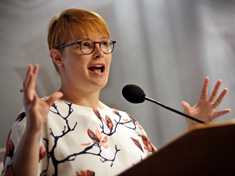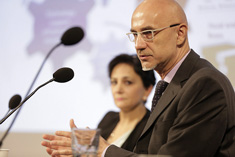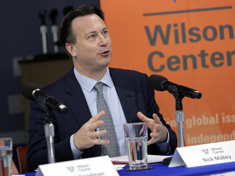
Sean Peoples
Sean Peoples is a multimedia producer working with the Wilson Center’s Environmental Change and Security Program.
Through documentaries, interviews, and podcasts, Sean explores the intersection of conservation and health in the developing world. The short documentary Broken Landscape: Confronting India’s Water-Energy Choke Point won Honorable Mention in the category of Outstanding Feature Story by the Society of Environmental Journalists' Awards for Reporting on the Environment, as well as a 2015 Silver Telly award. Other Telly Award-winning documentaries produced by Sean include Healthy People, Healthy Environment: Integrated Development in Tanzania and Scaling the Mountain: Protecting Forests for Families in Nepal.
Sean served as a program associate at the Wilson Center for nine years. Before that, he worked as associate director for Congressional Programs at the Population Resource Center. Sean has a BA from American University in Political Science with a focus on environmental policy issues.
Twitter: @S_Peoples
-
A Little Respect: Saraswathi Vedam on Reducing Over-Intervention in Maternal Care Through More Autonomy
› Governments and health organizations have made remarkable gains in reducing maternal mortality and morbidity rates around the world. Much of those gains have been driven by increasing capacity, directing more women to hospitals and clinics to ensure they get modern medical care. Increasingly, however, experts are realizing that this push has brought challenges of its own.
Governments and health organizations have made remarkable gains in reducing maternal mortality and morbidity rates around the world. Much of those gains have been driven by increasing capacity, directing more women to hospitals and clinics to ensure they get modern medical care. Increasingly, however, experts are realizing that this push has brought challenges of its own. -
Samara Ferrara on How Midwifery Can Reduce Unnecessary Surgeries and Save Lives in Mexico
› “Midwives have the knowledge, midwives have the skills, and have the heart and compassion to serve mothers and babies in the most perfect way,” explains Samara Ferrara in this week’s podcast. But they often face demoralizing conditions, poor pay, and in some cases disdain from doctors.
“Midwives have the knowledge, midwives have the skills, and have the heart and compassion to serve mothers and babies in the most perfect way,” explains Samara Ferrara in this week’s podcast. But they often face demoralizing conditions, poor pay, and in some cases disdain from doctors. -
Reproductive Health Care in Crises Has Come a Long Way, Says Sandra Krause, But There’s More to Be Done
› There may be more women and girls at risk of maternal health complications in fragile and conflict-affected settings today, but attention to the issue is not new and the international community has made important strides over the last 20 years, says Sandra Krause, program director for reproductive health at Women’s Refugee Commission, in this week’s podcast.
There may be more women and girls at risk of maternal health complications in fragile and conflict-affected settings today, but attention to the issue is not new and the international community has made important strides over the last 20 years, says Sandra Krause, program director for reproductive health at Women’s Refugee Commission, in this week’s podcast. -
Elena Ateva on Putting the Individual at the Center of Maternal Care
› Exactly one year after the adoption of the Sustainable Development Goals in September 2015, The Lancet published a special series on achieving maternal health priorities in the SDG era, with a focus on quality, equity, strengthening entire health systems, sustainable financing, and collecting better evidence.
Exactly one year after the adoption of the Sustainable Development Goals in September 2015, The Lancet published a special series on achieving maternal health priorities in the SDG era, with a focus on quality, equity, strengthening entire health systems, sustainable financing, and collecting better evidence. -
To Be Young, Libyan, and Female: Alaa Murabit on Building Civil Society After Gaddafi
› In the turbulent days following the 2011 fall of Colonel Muammar Gaddafi’s government, Dr. Alaa Murabit found herself in Libya’s fragile capital, Tripoli, observing exchanges between parliamentarians and civil society over the future of the country. For over 40 years, this kind of discussion was unthinkable – not the least, for a young woman.
In the turbulent days following the 2011 fall of Colonel Muammar Gaddafi’s government, Dr. Alaa Murabit found herself in Libya’s fragile capital, Tripoli, observing exchanges between parliamentarians and civil society over the future of the country. For over 40 years, this kind of discussion was unthinkable – not the least, for a young woman. -
Alix Bacon on Building a Global Community of Midwives
›
The fourth global Women Deliver conference in May brought nearly 6,000 experts and advocates to Copenhagen to address the health and rights of women and girls, including a small group of young midwives who attended a symposium beforehand. “I went in a little bit skeptical,” says Alix Bacon, president of the Midwives Association of British Columbia and one of 32 women under 35 who received a scholarship to attend, in this week’s podcast. “And I came home a changed woman and a believer.”
-
How to Translate Paris Pledges Into Action? Regulatory Frameworks, Says World Bank’s Grzegorz Peszko
›
Nearly six months after the Paris climate agreement, the international community’s attention has shifted from celebration to implementation. Governments have begun outlining climate pledges in the form of intended nationally determined contributions, or INDCs – which are fast becoming nationally determined contributions, or NDCs, as they begin influencing policy.
-
Paris Was a Success, But the Climate-Security Response Is Lagging, Says Nick Mabey
›
In the months leading up to the United Nations conference on climate change in Paris last fall, expectations were high. And the result actually exceeded those expectations in many respects, says Nick Mabey, director and chief executive at the environment consultancy E3G, in this week’s podcast.


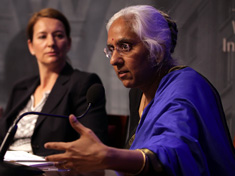 Governments and health organizations have made remarkable gains in reducing maternal mortality and morbidity rates around the world. Much of those gains have been driven by increasing capacity, directing more women to hospitals and clinics to ensure they get modern medical care. Increasingly, however, experts are realizing that this push has brought challenges of its own.
Governments and health organizations have made remarkable gains in reducing maternal mortality and morbidity rates around the world. Much of those gains have been driven by increasing capacity, directing more women to hospitals and clinics to ensure they get modern medical care. Increasingly, however, experts are realizing that this push has brought challenges of its own.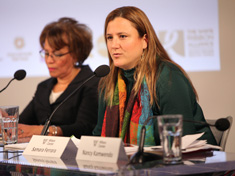 “Midwives have the knowledge, midwives have the skills, and have the heart and compassion to serve mothers and babies in the most perfect way,” explains Samara Ferrara in this week’s podcast. But they often face demoralizing conditions, poor pay, and in some cases disdain from doctors.
“Midwives have the knowledge, midwives have the skills, and have the heart and compassion to serve mothers and babies in the most perfect way,” explains Samara Ferrara in this week’s podcast. But they often face demoralizing conditions, poor pay, and in some cases disdain from doctors.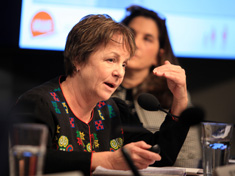 There may be
There may be 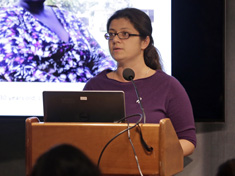 Exactly one year after the adoption of the Sustainable Development Goals in September 2015,
Exactly one year after the adoption of the Sustainable Development Goals in September 2015, 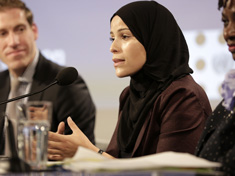 In the turbulent days following the 2011 fall of Colonel Muammar Gaddafi’s government, Dr. Alaa Murabit found herself in Libya’s fragile capital, Tripoli, observing exchanges between parliamentarians and civil society over the future of the country. For over 40 years, this kind of discussion was unthinkable – not the least, for a young woman.
In the turbulent days following the 2011 fall of Colonel Muammar Gaddafi’s government, Dr. Alaa Murabit found herself in Libya’s fragile capital, Tripoli, observing exchanges between parliamentarians and civil society over the future of the country. For over 40 years, this kind of discussion was unthinkable – not the least, for a young woman.